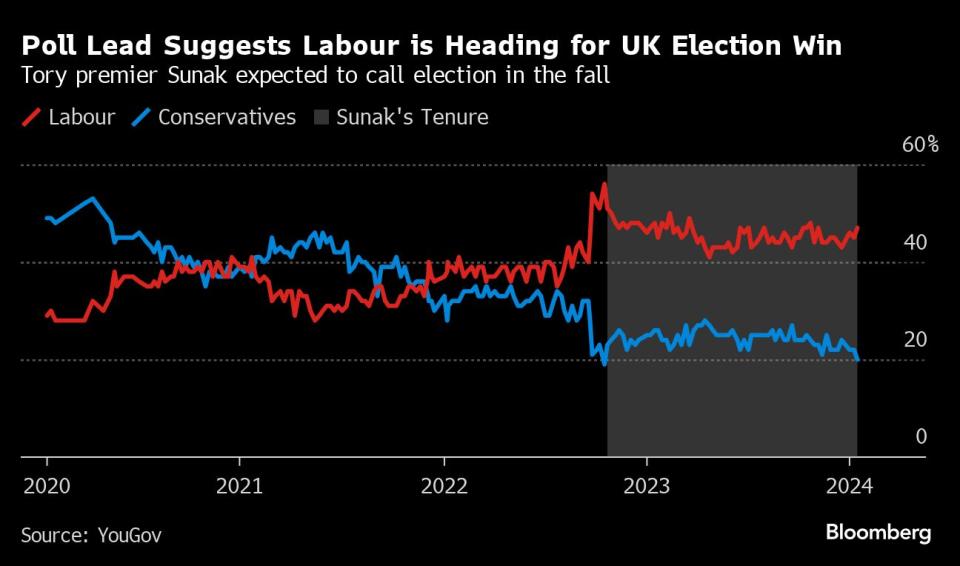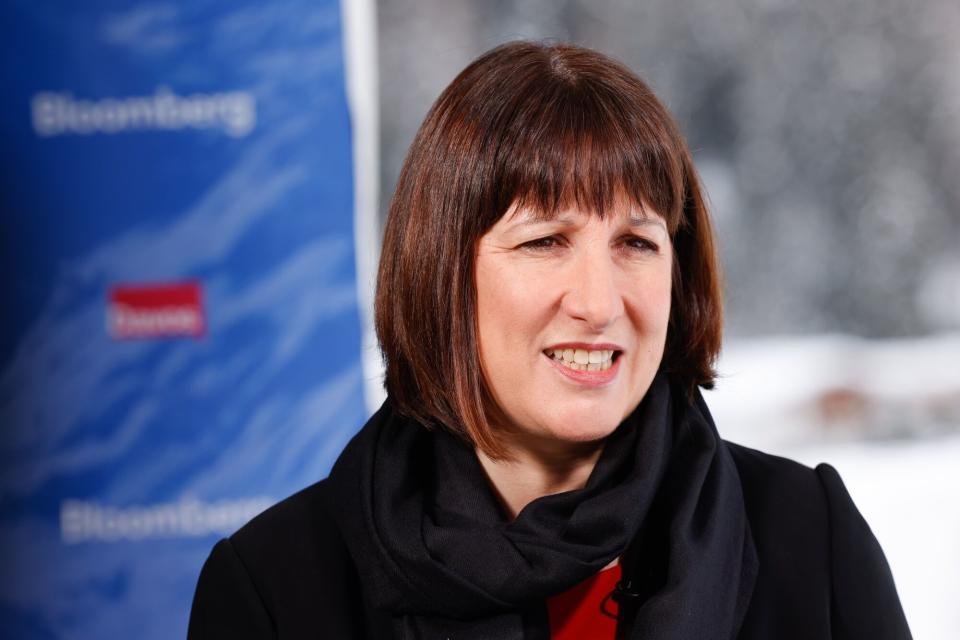Labour Steals Davos Spotlight, But Faces UK Tax Plan Questions
- Oops!Something went wrong.Please try again later.
- Oops!Something went wrong.Please try again later.
- Oops!Something went wrong.Please try again later.
- Oops!Something went wrong.Please try again later.
(Bloomberg) -- As the illusionist David Blaine performed magic for the UK Labour Party’s top economic team at an exclusive party in Davos in the early hours of Thursday, Conservative Chancellor of the Exchequer Jeremy Hunt was finally arriving at the gathering of the world’s elite.
Most Read from Bloomberg
Putin Orders Hunt for Property of Russian Empire, Soviet Union
Hedge Funds Rake in Huge Profits Betting on Catastrophe Risk
Musk’s AI Startup Secures $500 Million Toward $1 Billion Funding Goal
China’s $6.3 Trillion Stock Selloff Is Getting Uglier by the Day
With Hunt arriving late and Business Secretary Kemi Badenoch canceling her visit amid a series of crunch votes in Westminster on the government’s flagship immigration plans, shadow chancellor Rachel Reeves and Jonathan Reynolds, Labour’s business spokesman, had executives interested in Britain to themselves for the start of the World Economic Forum’s annual jamboree in the Swiss resort.
Labour’s voice matters to business because Keir Starmer’s party enjoys a huge polling lead over the governing Conservatives ahead of a UK general election expected later this year. Cabinet veteran Hunt — who many expect to retire before or at the election — pulls the economic levers in Britain for now, but by this time next year, it could be Reeves holding the controls.
Executives said they had questions about Labour’s tax proposals and whether it will see the present government’s city reforms through, but the optics were good for the opposition party in terms of its relations with business.
During the day, executives and investors crowded into events hosted by JPMorgan Chase & Co. and Bank of America Corp. to hear what Reynolds and Reeves had to say about their plans for Britain. By night, the opposition politicians mingled with Blaine, Sting, and former US Secretary of State John Kerry at a party organized by Matthew Freud’s Goals House, while at a JPMorgan do, the shadow chancellor was photographed with CEO Jamie Dimon and rubbed shoulders with the likes of Revolut Ltd. Chairman Martin Gilbert and London Stock Exchange Group Plc CEO David Schwimmer.
As Reeves and Reynolds munched on their Swiss breakfasts — Reynolds was particularly effusive about Bank of America’s “outstanding” orange juice — the atmosphere was a long way from the days when Jeremy Corbyn led Labour, sending companies into a panic that if he won power the left-leaning politician would introduce a bevy of anti-business policies. Reynolds told Bloomberg in an interview that the absence of ministers in the early days of the forum had benefited Labour.
“The surprise was obviously that the government couldn’t get out to the beginning of this, and therefore if you want to talk to politicians in the UK it’s been Rachel and myself as the people available to do that,” he said.
Once Hunt did arrive, the government’s show got into motion. He spoke on a panel about technology alongside Microsoft Corp. Chief Executive Officer Satya Nadella and Moderna Inc. CEO Stéphane Bancel, while Alphabet Inc.’s Google timed an announcement that it was investing $1 billion in a new data center in the UK with the chancellor’s appearance in Davos.
Hunt was also the main guest at a lunch hosted by KPMG and attended by the Lloyds Banking Group Plc CEO Charlie Nunn as well as senior executives at Sequoia Capital and Canada’s giant pension fund CPP, according to two people present. The attendees thought Hunt had sensible messages but pointed to the problem that the Conservatives would probably not be around to implement them.
The Google investment in the data center — its first in the UK — is a “big sign of confidence” in Britain, Hunt told Bloomberg TV. “What I’m detecting here in Davos is a recognition that the UK has become one of the great technology centers of the world,” he said.
Hunt promised to continue with plans to boost listings, reform pensions to unleash billions of pounds for investment and make the UK more competitive. His ambition, he told the lunch gathering, is to make the London Stock Exchange the Nasdaq of Europe, one person present said. Bolstering his pitch to the senior figures was Investment Minister Dominic Johnson, while Franck Petitgas, the ex-Morgan Stanley banker turned Number 10 business adviser, has also quietly lobbied businesses in the Alpine resort, several people said.
Hunt also repeated an oft-used attack line about how Labour plans to fund a proposed £28 billion ($36 billion) of annual investment in net zero by the end of the next Parliament.
The message to international businesses from both the Tories and Labour was similar: we want to help you invest in Britain. But senior figures attending Davos said Reeves and Starmer still have questions to answer over policies, and they want Labour’s openness to business to continue.
“We were asked one question at a breakfast meeting yesterday - someone said ‘we just want you to promise you’ll be as good if you form the government as you are with this kind of engagement in opposition’,” Reynolds said. He also told Bloomberg that helping business to thrive was key to Labour’s aims of being able to invest in public services.
“We see not just the economic agenda of the future Labour government, but the whole policy agenda as being contingent on increasing business investment, better productivity, better growth,” he said.
On specific policies, business wants to know exactly how Labour will shape its plans to tax non-doms and what will be included in its reforms of tax on private equity barons, one businessman who has been a Conservative donor said. There is also a lack of clarity in areas such as the levy on banks’ balance sheets, several people said. One international banker, responsible for his institution’s operations in London, said he wanted Labour to sign up to every one of the government’s competitiveness measures such as its Edinburgh Reforms.
But for all the questions, the turnaround in Labour’s relations with business serves to emphasize how far the party has come since suffering its worst electoral defeat in more than eight decades.
As Blaine performed card tricks for Labour’s leading lights in Switzerland, a new YouGov poll in the Times showed the opposition extending its polling lead to 27 points. No party has ever come back from the scale of defeat Labour suffered in 2019 to win the next election. But if the polls are borne out at the ballot box, Labour may just turn illusion into reality.
Most Read from Bloomberg Businessweek
©2024 Bloomberg L.P.




